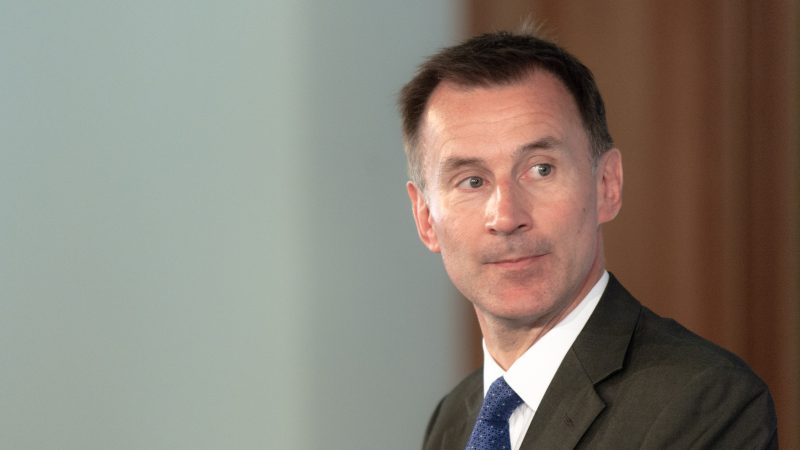
In the wake of the disastrous Liz Truss/Kwasi Kwarteng mini-Budget, a strange new object has come to dominate discussion of the economy: an alleged “black hole”, perhaps as big as £50bn, that has now apparently opened up in the public finances.
It’s worth being clear about this: the black hole does not exist – not in the same way that, say, rapidly rising prices for basic food exists, or low wages exist, or NHS waiting lists exist. These are all material facts that, right now, shape how people live their lives. The “fiscal hole” isn’t anything like this. It’s the product of highly uncertain forecasts about future economic growth and interest rates over the next five years, combined with the government’s own target for reducing the debt in five years’ time. Change the forecasts or change the target and the black hole can shrink or even disappear entirely.
New research from the Progressive Economy Forum shows that the effects of forecasts or rule changes affect the size of this so-called black hole far more than government spending or tax changes. Shifting the measure of the government’s debt back to the measure the Office for Budget Responsibility was using up to January this year, for example, not only eliminates the black hole entirely – it leaves the government with another £14bn to spare against its own target.
Our argument is simple. Given the sensitivity of this so-called black hole to highly uncertain forecasts and to changes in the government’s target, and given what we know about the dramatic costs of austerity, it would be extremely foolish to argue for a return to spending cuts to try and close the so-called black hole. Better, instead, to concentrate on the real economic problems we face: crumbling public services, failing infrastructure and massive inequality.
Austerity means doing the exact opposite of this: it means privileging financial outcomes over real-world impacts. It means, as Rupert Harrison – George Osborne’s chief adviser who now sits on the government’s economic advisory council – explains, trying to shore up “credibility” in the eyes of the financial markets in case we need to borrow for some future disaster. But by weakening our public services, austerity meant we were less prepared for crises like Covid-19 – with the Marmot Review demonstrating how austerity led directly to worse outcomes and more deaths during the pandemic. Without austerity, Covid would have been less costly, both in human and financial terms. Britain spent far more than other countries.
And we know from the decade of austerity that imposing spending cuts damages our public services and undermines the wider economy. We have an estimate of the cost of this wider economic damage from Oxford economist Simon Wren-Lewis: £10,000 for every household in the country. That damage to output in turn has meant lower growth and actually made shrinking the size of the government’s debt (relative to the whole economy) harder, creating the “doom-loop” that Confederation of British Industry boss Tony Danker has rightly warned about: austerity to shrink the debt makes the economy weaker, thus making the debt harder to shrink, leading to demands for more austerity, and so on in a spiral downwards.
For all these reasons, it is essential Labour opposes austerity. However, the government intends to lay a trap: recognising the unpopularity of spending cuts, Chancellor Jeremy Hunt is seemingly planning to delay most of them until after 2024 – that is, after the date of the next election. (George Osborne tried to pull a similar trick in 2015.) The idea is to throw down a gauntlet to Labour: they either have to accept or reject future austerity. In the 2010s, this created an almighty political row, with Labour’s leadership desperately working against a then-consensus view that repaying the government debt as fast as possible was an essential. The fudge of “too far, too fast” that then-Shadow Chancellor Ed Balls tried to cling to couldn’t and didn’t work, satisfying neither those who thought austerity was necessary (why vote for the second-rate version of the same thing?), nor those who thought it wasn’t necessary.
Nor should Labour think, as no doubt some will think, that it can repeat the trick of 1997, promising to stick to Conservative spending plans for a few years after the election. What (arguably) worked in the late 1990s with a booming economy is going to be absolutely unworkable in the train-wreck economy of the mid-2020s. The damage of the austerity decade and global instability demand higher government spending, across the board – from putting the NHS back on its feet to adapting to climate change.
There is no reason to make the same mistake again. The tide has turned against austerity as the government’s slipperiness and defensiveness suggests. The party has every opportunity to be resolute on this point: austerity didn’t work before, and won’t work in the future; the argument for imposing it – the so-called black hole – is a statistical fiction. Labour can and should be the party that looks to support the real economy, the one we actually have to live in, rather than playing up to the fakery of black holes. An outline fiscal programme would be to have tax rises on the wealthiest (examples are given here), and some reasonable plan to have debt to GDP falling – a rolling target for reducing the current deficit is enough to achieve this – combined with the essential investment spending.




More from LabourList
Nudification apps facilitate digital sexual assault – and they should be banned
Diane Abbott suspended from Labour after defending racism comments
Labour campaign groups join forces to call for reinstatement of MPs